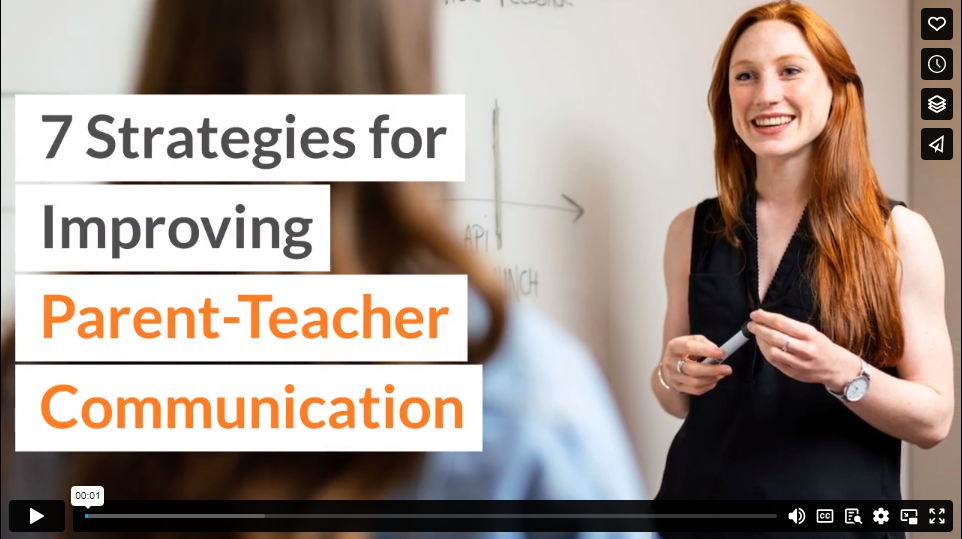Healthy communication between parents and teachers is critical to helping your child succeed and thrive in school. However, these waters can be challenging to navigate. Misunderstandings and miscommunication are just two of the many pitfalls parents and teachers can encounter as they seek to interact. As you prepare for the upcoming school year, developing a game plan for parent-teacher communication may be helpful. Here in Atlanta, our private elementary school teachers have some tips that will aid in building stronger communication and partnerships between parents and teachers. If you want to start the school year off well, try implementing these strategies
1. Start strong.
Introduce yourself to your child’s new teacher before the first day of school. A quick phone call can go a long way in setting the tone for the rest of the year and could also be an excellent opportunity for your child to become a little more comfortable with their new teacher. Try to keep the conversation short and sweet, and aim to start things off on a positive note.
2. Initiate regular, in-person contact.
Although daily drop-off and pick-up times can seem rushed and don’t allow for much interaction with your child’s teacher, try to be intentional about making opportunities for in-person contact. This might mean planning to arrive at school a few minutes early so you can walk your child to their classroom and greet the teacher. Or, it could mean checking in with the teacher at pick-up to inquire about how your student’s day went. Though these efforts may seem small, interacting with your child’s teacher in person will help build the bridge to healthier communication.
3. Communicate with your child.
Parent-teacher communication can’t reach its full potential without strong parent-student communication. Talk with your child about what goes on inside the classroom. Ask them about their day and try to reach beyond an ‘It was good’ response. Your child should know that should they encounter a problem at school, they can come to you about it right away. This can help eliminate the shock of learning about big issues from their teacher after the fact, or once behavior or disruptions reach a certain point.
4. Handle serious issues by phone.
When it comes to difficult situations, a lot can be lost or misunderstood when communicating through email. A phone call can help both parties avoid miscommunication as you seek to understand the situation entirely. Rather than waiting on replies, you’ll be able to come to a decision or understanding promptly, ensuring that you and your child’s teacher are on the same page.
5. Respect the teacher’s time.
Teachers put in long hours at school and home, and like the rest of us, they sometimes need a break. Don’t assume that your child’s teacher is available to communicate 24/7. Instead, respect their time and try not to feel frustrated if you reach out and don’t get a response on an evening or weekend. If the matter is urgent, a phone call shortly after school may be the best course of action.
Additionally, if you have a meeting or phone call with your child’s teacher, try to keep it short and concise. With papers to grade, lessons to plan, and emails to answer, they’ll appreciate your respecting their time by trying not to take up too much of it.
6. Speak with the teacher before going to the principal.
If an issue arises and you are unhappy with the way it was handled by your child’s teacher, seek to work it out with them before going straight to the top. Jumping the chain of command indicates an unwillingness to hear the teacher out, which is what the principal of any independent school will likely encourage you to do anyway. If, after discussing things with your child’s teacher, things still are not resolved, a meeting with the principal may be in order.
7. Get involved.
Getting involved is one of the best ways to encourage healthy communication between you and your child’s teacher. You can volunteer for field trips or help out in the classroom if your schedule permits. If not, ask your child’s teacher for other ways that you might be able to stay involved in your child’s school life.
Bonus Tip: Remember the Goal
Remember that at the end of the day, you and the teacher both want what is best for your child. You want your child to grow and thrive in the classroom, and so do they! When parents and teachers can communicate in a healthy and positive manner, your child will reap the rewards both at school and at home.
Infographic
Effective communication between parents and teachers is vital for the success and well-being of your child in school. However, navigating these waters can be challenging, with misunderstandings and miscommunication being potential pitfalls. As you gear up for the approaching school year, devising a strategic plan for parent-teacher communication becomes crucial. Private elementary school teachers in Atlanta offer valuable insights to enhance communication and partnerships between parents and teachers.

Video

